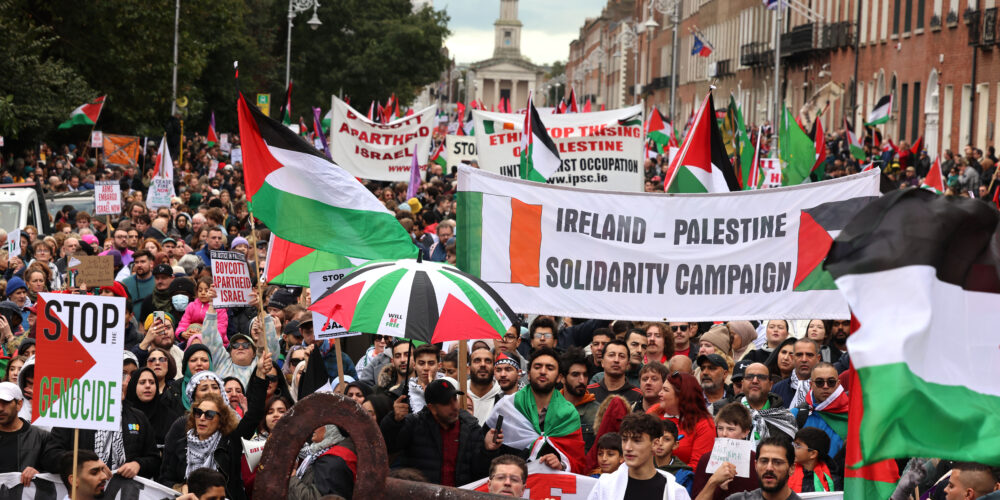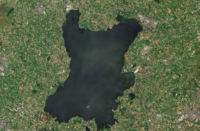There’s been a word on every activist’s lips recently; burnout. For the last 7 months, thousands of people who typically spend their evenings or weekends stopping illegal evictions, tackling environmental collapse, unionising workplaces, undermining the recently empowered far-right and a plethora of political and altruistic endeavours, have added the genocide in Gaza atop their shoulders.
A lot of the month to month work has pivoted, or has been dropped outright, in an attempt at addressing the most TikToked genocide of a generation, and it seems some are feeling the pressure. Weekly, reoccurring demonstrations across the island, leafleting, fundraising, boycotting actions, monthly trips to Shannon Airport, hours-long treks to Ballsbridge (where the war criminals keep their embassies), and a whole host of other actions has many run ragged – if I’m to believe the conflabs over post-protest pints.
“This could sound utterly cynical, but” prefaced Kevin Squires, National Coordinator of the Ireland Palestine Solidarity Campaign (IPSC), “this is a marathon, it’s not a sprint.”
However, it’s clear to both Squires and the wider world, that “the years and years of work that activists are doing on the ground, compounded with these atrocities we’re seeing on a daily basis, has borne fruit in Ireland”. While some whisper about the daunting task in front of them, 100,000 attendees at a recent Dublin demonstration is nothing to scoff at. It’s the biggest foreign policy demo since protests on the eve of the 2003 US-UK Iraq invasion, as well as being one of the biggest in Ireland’s history.
“There’s hopeful signs in Ireland, polls are showing 80% understand that this is genocide, 70% understand it’s apartheid, 70% want sanctions… and it’s worth noting that the ‘don’t knows’ often outnumber the pro-Israel rump.” The IPSC has also heard it’s language echoed in the chambers of Dáil Éireann – although often so politicians can ‘bask in the moral glow’ of condemnation, to quote Sally Rooney’s March Irish Times op-ed.
Squires has 22 years of Palestine solidarity activism under his belt and the thickened skin needed to push through the nightmares we’re seeing every day on our screens, “then you focus on ‘what can we do to stop this’ as opposed to letting the trauma dictate your response.” He also had some important reflection to keep in mind for all of us hitting the streets every week. “Maybe there’s a nicer way of saying this, but is the action about you or is it about Palestine. Is it about making you feel better or is it about trying to leverage some point where you’re actually making some sort of difference.”
A heavy workload without a strategy in place is the perfect recipe for burnout. “Pick focused targets”, stresses Squires, because, “we need to use this period to, of course protest against what’s happening, but to toxify Israel’s image in the public eye as much as we can, to make it so the apartheid state can’t come back from this.
“What we don’t want is people thinking, day one after a ceasefire is announced, that we can all go back to normal now.”
The continued, weekly protests across towns and municipalities have been an inspiring sight for the IPSC, as well as the “groundswell of grassroots groups”, like Dublin4Gaza, Mothers Against Genocide and Irish Healthcare Workers For Palestine, to name just a few. The IPSC is, after all, not a “monopolistic organisation”.
Immediate term strategies for the solidarity group are set on AXA/Laya’s involvement with settlement-financing Israeli banks, RTÉ’s and Eurovision’s ‘art-washing’ of Israeli crimes, and the campaign to ban Israel from international sports.
With a Palestinian Women’s Football Team’s match in Dublin, courtesy of Bohemian F.C., on May 15th, Squires encourages “everyone who can to come along to that, buy a ticket and show your solidarity with Palestinian sports people. They’ve lost family and friends and had their sports facilities destroyed. It’s important that we give them the biggest welcome that we can.”
You can support the IPSC’s targeted work through getting involved in your nearest branch or through ipsc.ie/donate. “Every national demo costs us about €8,000, so if you can donate, please do, thank you!”






